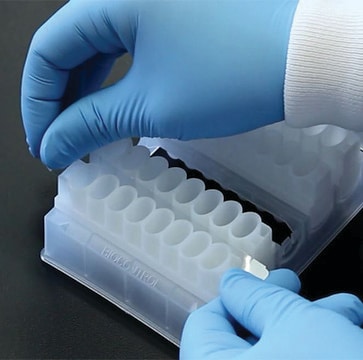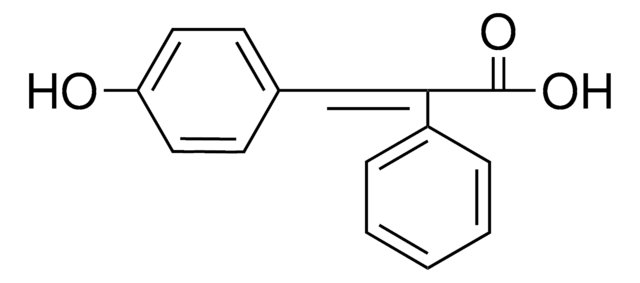General description
ASF/SF2 (alternative splicing factor/splicing factor 2)/splicing factor, arginine/serine-rich 1 (SFRS1) is a sequence specific (5′-splice cleavage) splicing factor involved in pre-mRNA splicing/alternative splicing. ASF/SF2 also mediates mRNA nuclear export and translation processes. ASF/SF2 supports genomic stability by impeding formation of mutagenic DNA:RNA hybrid R loop structures between the transcript and the template DNA. ASF/SF2 is involved in the replicaton of HIV-1.
Specificity
Anti-SFRS1 (AB1) polyclonal antibody reacts with chicken, canine, bovine, pig, human, mouse, rat, and zebrafish ASF/SF2 proteins.
Immunogen
Synthetic peptide directed towards the C terminal region of human SFRS1
Application
Anti-SFRS1 (AB1) polyclonal antibody is used to tag ASF/SF2 (alternative splicing factor/splicing factor 2)/ splicing factor, arginine/serine-rich 1 for detection and quantitation by Western blotting and in plasma by immunohistochemical (IHC) techniques. It is used as a probe to determine the roles of ASF/SF2 in pre-mRNA splicing, mRNA export and translation and genome stabilization.
Biochem/physiol Actions
SFRS1 is a member of the arginine/serine-rich splicing factor protein family, and functions in both constitutive and alternative pre-mRNA splicing. The protein binds to pre-mRNA transcripts and components of the spliceosome, and can either activate or repress splicing depending on the location of the pre-mRNA binding site. The protein′s ability to activate splicing is regulated by phosphorylation and interactions with other splicing factor associated proteins. Multiple transcript variants encoding different isoforms have been found for this gene.Alternative mRNA splicing plays an important role in development and differentiation; many transcripts are spliced differently in distinct cell types and tissues. Both constitutive and alternative splicing occurs on spliceosomes, which are complex particles composed of small nuclear ribonucleoproteins (snRNPs) and non-snRNP proteins. The SR family of non-snRNP splicing factors is characterized by the presence of an RNA recognition motif and a serine- and arginine-rich (SR) domain. SR proteins are required at early stages of spliceosome assembly, have distinct but overlapping specificities for different pre-mRNAs, and can alter splice site choice, suggesting that they may be involved in the regulation of alternative splicing in vivo. Two of the SR proteins, ASF/SF2 (SFRS1) and SC35 (SFRS2; MIM 600813), have been extensively characterized.Alternative mRNA splicing plays an important role in development and differentiation; many transcripts are spliced differently in distinct cell types and tissues. Both constitutive and alternative splicing occurs on spliceosomes, which are complex particles composed of small nuclear ribonucleoproteins (snRNPs) and non-snRNP proteins. The SR family of non-snRNP splicing factors is characterized by the presence of an RNA recognition motif and a serine- and arginine-rich (SR) domain. SR proteins are required at early stages of spliceosome assembly, have distinct but overlapping specificities for different pre-mRNAs, and can alter splice site choice, suggesting that they may be involved in the regulation of alternative splicing in vivo. Two of the SR proteins, ASF/SF2 (SFRS1) and SC35 (SFRS2; MIM 600813), have been extensively characterized (Bermingham et al., 1995).[supplied by OMIM].
Sequence
Synthetic peptide located within the following region: EFVRKEDMTYAVRKLDNTKFRSHEGETAYIRVKVDGPRSPSYGRSRSRSR
Physical form
Purified antibody supplied in 1x PBS buffer with 0.09% (w/v) sodium azide and 2% sucrose.
Disclaimer
Unless otherwise stated in our catalog or other company documentation accompanying the product(s), our products are intended for research use only and are not to be used for any other purpose, which includes but is not limited to, unauthorized commercial uses, in vitro diagnostic uses, ex vivo or in vivo therapeutic uses or any type of consumption or application to humans or animals.









